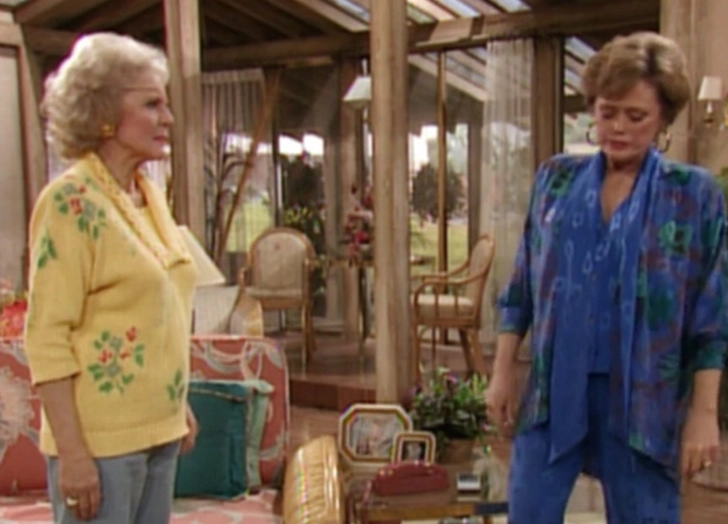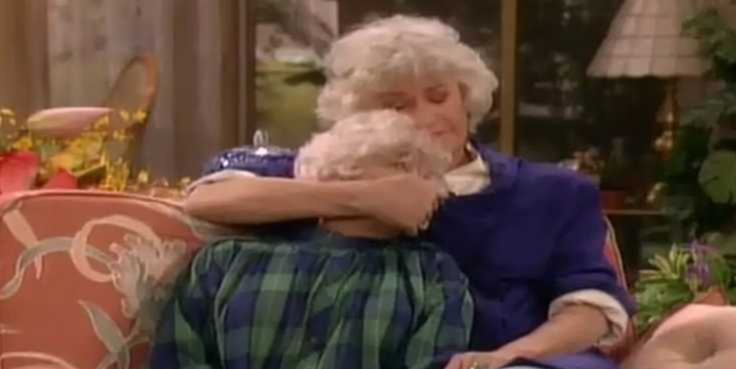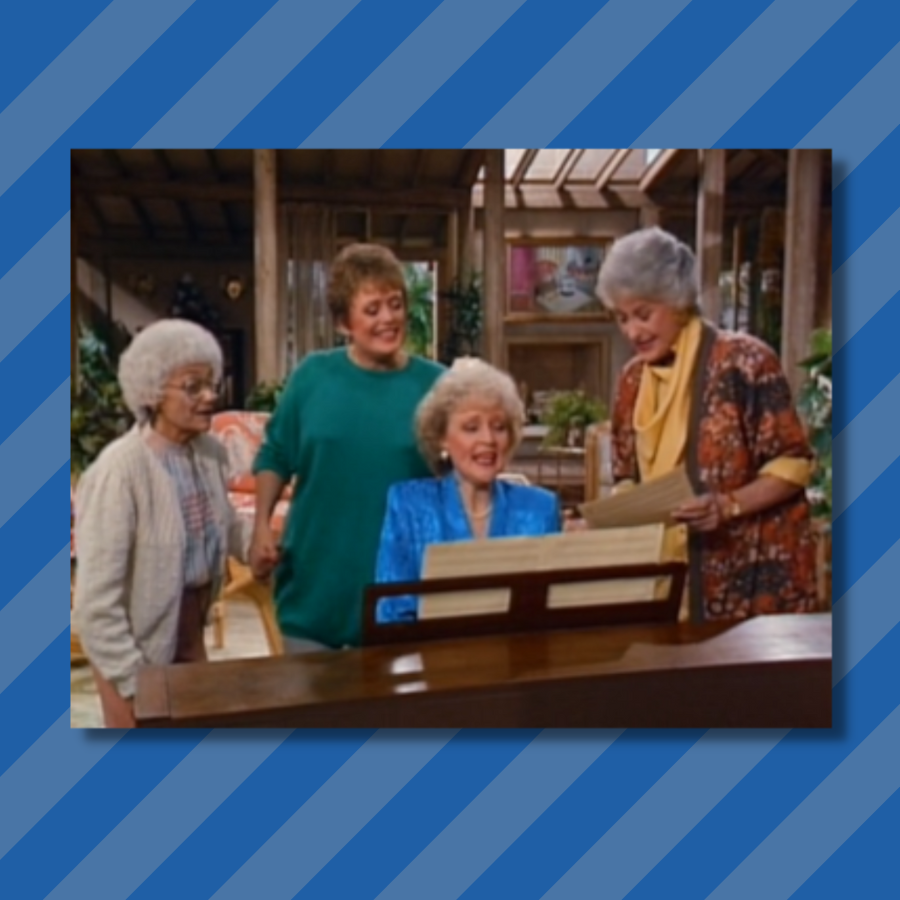“I might have AIDS, and it scares the hell out of me…This isn’t supposed to happen to people like me,” Rose tells Blanche in the kitchen of their ranch-style Miami home.
Rose was waiting to hear if she has HIV, which she possibly contracted from a blood transfusion she received during gall bladder surgery. She storms out of the kitchen after suggesting that Blanche, the most sexually-liberated of the Golden Girls, should be in her predicament, and not a “good person” like her.
“AIDS is not a bad person’s disease, Rose. It is not God punishing people for their sins,” Blanche snaps back before revealing to Rose that she was previously tested for HIV. She goes on to tell Rose that she didn’t tell anyone at the time, presumably due to shame.
The Golden Girls episode, which aired in 1990, was one of the first times a television show — a sitcom at that — depicted a stigmatized disease that became a leading cause of death in the United States in the late 80s. Despite HIV/AIDS’ widespread devastation, it was still branded a gay men’s disease, with some even celebrating it as a punishment for homosexuality. What the episode showed, through humor, is that four middle-class White women were not spared by this epidemic and were capable of deconstructing the fearmongering that was all too present at the time.
In its seven seasons, the Norman Lear-created show took on other sensitive subjects, including interracial dating, suicide, and artificial insemination. Though it’s not easy to explore these issues, The Golden Girls often achieved this masterfully without detracting from its humor. The show gave space for Blanche, Rose, Dorothy, and Sophia to have shortcomings and biases, but it provided just as much space for them to challenge each other. They were allowed to be imperfect, to be human.
No show is immune to weaknesses, including The Golden Girls. The show facilitated hard conversations in many households, but sometimes its brand of humor sometimes prevented itself from making more headway as it fell back on hackneyed and reductive jokes.
‘Picture It…’
The house’s matriarch, Sophia, never held back about how her son, Phil, was an embarrassment. She repeatedly quipped about her son’s crossdressing, to the point that it was an ongoing joke on the show. Her son was never depicted on The Golden Girls, but his life became a central topic when he dies at age 55. Dorothy laments about never getting to tell her younger brother she loved him, but Sophia’s feelings are more complex.
In the closing scene, Sophia lashes out at her son’s widow after the funeral for not stopping the “dress thing.” Sophia becomes increasingly angry as she reveals that she believed Phil’s crossdressing was somehow been her fault. His widow explains that Phil was a wonderful father, husband, and provider.
Rose offers, “Let go of the shame. So what if he was different? It’s okay that you loved him.”
“I did love him,” Sophia says through tears. “But every time I saw him I always wondered, what I did, what I said. When was the day I did whatever I did to make him who he was?”
It was presumably the moment that Sophia realized that her son wasn’t a bad person. He wasn’t abusive or manipulative, but societal norms robbed her of the time she could’ve celebrated her son. It was a pivotal moment in The Golden Girls as it faced the mirror back on the viewers and forced them to think about why Phil was the show’s residual punchline.

Rose’s character — a bubbly yet dense grief counselor from the midwest — was the source of comedic relief. However, her character gained a new dimension when her 30-year addiction to painkillers is revealed. Rose explains that she was prescribed the pills after hurting her back on the farm. Dorothy and Blanche gently suggest that she may have become dependent on them, leading Rose to hand over the pill bottle and claim she doesn’t need them.
That night, Rose is caught tearing apart the kitchen to find some pills she has stashed away. Blanche, Dorothy, and Sophia catch her in the act, leading Rose to admit she has a problem. However, she remains adamant she can stop on her own.
“I can’t stop tonight because I’m afraid,” Rose says. “I can’t go to one of those places [rehab]. I’d be too ashamed.”
The household agrees to hold Rose accountable, but she admits to relapsing days later. Rose admits that her addiction is stronger than her friends’ support and that she will call rehab on her own.
With an ongoing opioid crisis, the 1989 episode is all too timely. It highlighted how there is no face of addiction, and that seeking help does not show weakness. The Golden Girls episode was also noteworthy as it used the most comedic Golden Girl to tackle a delicate topic.
All That Glitters Is Not Gold(en)

The Golden Girl’s unique brand of comedy was sometimes also its largest weakness. Sometimes the barrage of jokes stopped the show from unpacking topic matter to the point that it undermined its own message. One episode that is arguably the worst offender of this is “Blanche’s Little Girl,” in which Blanche’s estranged daughter, Rebecca, comes to Miami to reveal she is getting married. It is quickly revealed that Rebecca’s beau is verbally abusive towards her and regularly comments about her weight. While much of the episode is dedicated to Dorothy and Rose trying to convince Blanche to step in and stand up for her daughter, a lot of it involves the girls also joking about Rebecca’s weight.
While the episode ends with Blanche standing up to the boyfriend and Rebecca seeing him for who he is. It becomes hard to marry the episode’s logic: How is Rebecca’s boyfriend so detestable (and believe me he was) if her mother and other women keep mentioning her size as a punch line? It is unrealistic to expect Rose, Blanche, Dorothy, and Sophia to be 100 percent progressive on every issue, it may have been groundbreaking for them to have a moment of introspection regarding this issue and
“Some of the Southern qualities that made Blanche so funny on TV in the ’80s and ’90s, I’d find deplorable in a real person today.”
— An Injustice! Magazine writer Jeremy Helligar
Without too many words, The Golden Girl’s handling of race was imperfect. The lack of black characters on the show is apparent, but this remains an issue. These problems only seem to be magnified by Blanche, a southern belle and daughter of the Confederacy. Dorothy often joked about Blanche’s racist and biased upbringing and beliefs, it was never thoroughly challenged. Given how daring The Golden Girls was throughout its seven-season run, this doesn’t seem like a topic that’s too sensitive to engage.
As An Injustice! Magazine writer Jeremy Helligar notes, “Her exuberant embracing of the Confederate tradition… and her inconsistent views on gays seem surprisingly un-progressive in 2021 for a character who once confirmed the myth about Black men in bed and who remains beloved by gay men.”
It would be pretty hard to castigate The Golden Girls for a few shortcomings when it was ahead of its time on so many issues. The risks the show took were groundbreaking and integral in paving the way for women-centric television shows that followed. Focusing on The Golden Girls’ few shortcomings doesn’t diminish this. If anything, it’s a testament to how prescient the sitcom was.


I don’t think any of these compare to the episode when Sophia is dressed as slave maid!!! It’s the episode when Dorothy gets married to Blanche’s Uncle Lucas!!! I was horrified!!! I’m convinced that the riders for golden girls were extremely racist, and got away with it because of the lighthearted humor of the golden girls
This is a response in general… why when a show doesn’t include black characters is it a bad show or not progressive enough?
When there’s a black show on TV that doesn’t include white characters, no one says anything about that.
Most white people do not have black people in their lives at all. Why depict it on tv???
Btw I am of Mexican ancestry.
All you see on tv now is black people everywhere….ok we get it. Honestly….it was easier living in my own country where we could take pride in our people and our heritage because our people were the majority.
I know black Americans have struggled but to want to part of every show or somehow “it’s racist” is just ridiculous.
Excellent article! I also do wonder why they never explored racism it’s disappointing but as a first time viewer at 27 in 2024 not sure if that’s wrong of me to say. The reason I found this article is from watching I immediately recognised feminist icons and the impact this show had on many as older women who were independent and their lives were not completely revolved around men even Blanche, they all had their own interests and things going on and showed how a real sisterhood can get you through
I actually do think that if Bea Arthur hadn’t chose to leave the series, The Golden Girls *maybe* would’ve tackled racism in Season 8. After The Golden Girls, there was actually a short-lived successor called “The Golden Palace”, following Rose, Blance, and Sophia taking over a hotel. One of the main characters in that show is actually a black man, Roland, and one of the most memorable episodes I can remember was when Blanche’s friends from the South came up to the hotel. She went as far as hanging up the confederate flag in the hotel, and of course Roland took issue with that. Roland quit when Blanche refused to take the flag down, stating that the flag didn’t represent what he thought it did, and all it was was a representation of the happy memories with her family. But, when one of her friends acts blatantly racist towards Roland near the end, it all comes crashing down on her that Roland was right. That flag and the views of her friends and the confederacy had a dark side that she chose not to see. She goes up to Roland and apologizes, and laments on how everything she knew, her friends, her family, her memories, were now tarnished, “tarnished by the truth”. She vowed to be more aware of the things that bothered Roland, they make up. In the next shot with Rose manning the check-in, we can see that Blanche had finally taken down the flag. Of course, this is still a different show with different writers, so it could be that the show being different could’ve been the liberating factor that allowed them to write that story, so we’ll never truly know if The Golden Girls would’ve tackled the same topic, but I’m at least glad that they tackled it in the series eventually.